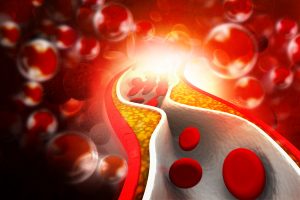
High cholesterol contributes to blood clots
Blood clots are the underlying cause of stroke and many heart conditions. High cholesterol causes the arteries to harden, making them less flexible. When it occurs, plaque begins to form along the artery walls, and the arteries become narrow as a result.
The caps of these built-up plaques can break off, exposing the plaque to the blood. The fatty material then triggers a blood clot to form on the plaque. This blood clot grows over time until eventually it blocks normal blood flow through the artery.
Heart attack is caused by the blockage of an artery in the heart, whereas stroke occurs when the blood clot blocks an artery in the brain.
To date, stroke and heart attack are the number one killers worldwide, and the World Health Organization estimates that cardiovascular disease is responsible for 30 percent of deaths in the world. This number is projected to hit 23 million people globally by the year 2030.
How to reduce your risk of blood clots
Cholesterol is just one factor that contributes to blood clot formation, but there are many more. Smoking, high blood pressure, diabetes, and obesity all promote blood clot formation, so it’s important that you quit smoking and control other factors.
An easy way to control blood pressure, obesity, and diabetes is through healthy lifestyle habits, which include a balanced diet and regular exercise. Your doctor can recommend tactics to help you achieve healthy numbers for blood pressure and sugar, and even the number you see on the scale.
Making an appointment with your doctor can help you uncover your own risk factors not only for blood clots but for cardiovascular disease in general. It’s never too late to start on the journey towards a healthier heart and a healthier you!
Sources:
http://www.everydayhealth.com/columns/health-answers/can-high-cholesterol-cause-blood-clots/